News
Our participation in the 6th International Conference on Perovskite Solar Cells and Optoelectronics (PSCO-2023)
Dr. Maria Hadjipanayi from the DegradationLab team of the University of Cyprus participated in the 6th International Conference on Perovskite Solar Cells and Optoelectronics (PSCO-2023) which took place in Oxford, UK from 18th -20th September 2023. As part of TESTARE networking and dissemination activities, Dr. Hadjipanayi delivered a poster presentation of the DegradationLab team’s work on perovskite testing titled “Learning curves from long-term outdoor testing and indoor optoelectronic characterization of perovskite mini-modules”.The PSCO conference programme included a combination of invited talks, contributing talks and poster presentations in an event which brought a broad spectrum of the perovskite community together to discuss and share knowledge on the latest advances in perovskite materials, devices and photophysical and optoelectronic properties, phenomena, and testing.
Additionally, this year the PSCO was combined with an industry day on the 21st September for interested PSCO and other participants to discuss Industrialization of Photovoltaics Thin Film Technology. Speakers from industry gave updates on the progress made and the challenges faced in this sector. Among them, Dr. Tom Aernouts, partner in TESTARE and representing IMEC/Solliance, presented long-term outdoor results from IMEC perovskite devices tested at the University of Cyprus in his talk ‘Scalable interface modifications to minimize cell to module performance gap’.
This work has been financed by the European Union through the TESTARE project (Grant ID: 101079488) and by the European Regional Development Fund and the Republic of Cyprus through the DegradationLab project (Grant ID: INFRASTRUCTURES/1216/0043).
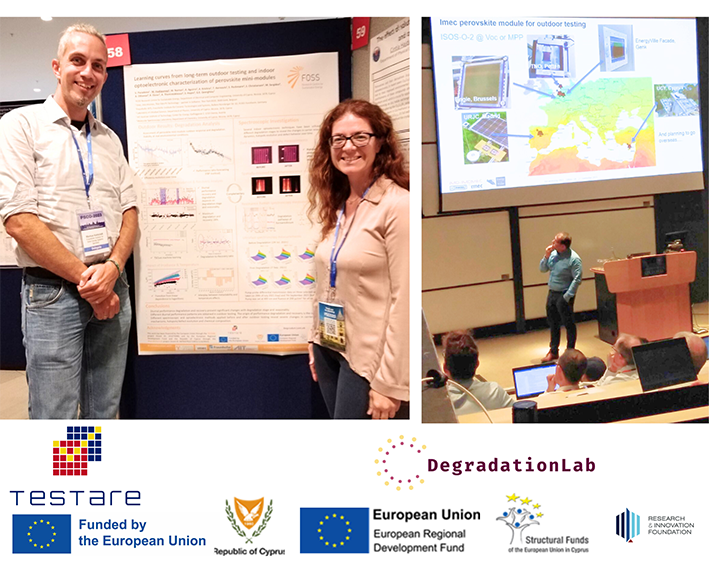
Dr. Elias Peraticos Presented the DegradationLab team’s work on Perovskite Photovoltaics at the 40th EU PVSEC 2023
On 19 September 2023, the post-doctoral researcher Elias Peraticos of the DegradationLab team delivered a poster presentation on “Correlative microscopy and spectroscopy of perovskite mini-modules: degradation analysis”, as part of TESTARE networking and dissemination activities, at the 40th European Photovoltaic Solar Energy Conference and Exhibition (EU PVSEC 2023).
The EU PVSEC is the largest international Conference for Photovoltaic research, technologies, and applications, with the conference's scientific programme coordinated by the European Commission Joint Research Centre. At the same time, the EU PVSEC serves as a PV Industry Exhibition, where specialised PV Industry presents technologies, innovations, and new concepts in the upstream PV sector. In this vein, the global PV community comes together under the auspices of the annual gathering to present and discuss the latest developments in Photovoltaics, as well as to network and conduct business.
This year’s edition of the EU PVSEC, which took place in Lisbon, Portugal, between 18 and 22 September 2023, celebrated the 40-year-long history of the science-to-science and science-to-industry platform that is uniquely focused on the global PV Solar sector.
This work has been financed by the European Union through the TESTARE project (Grant ID: 101079488) and by the European Regional Development Fund and the Republic of Cyprus through the DegradationLab project (Grant ID: INFRASTRUCTURES/1216/0043).
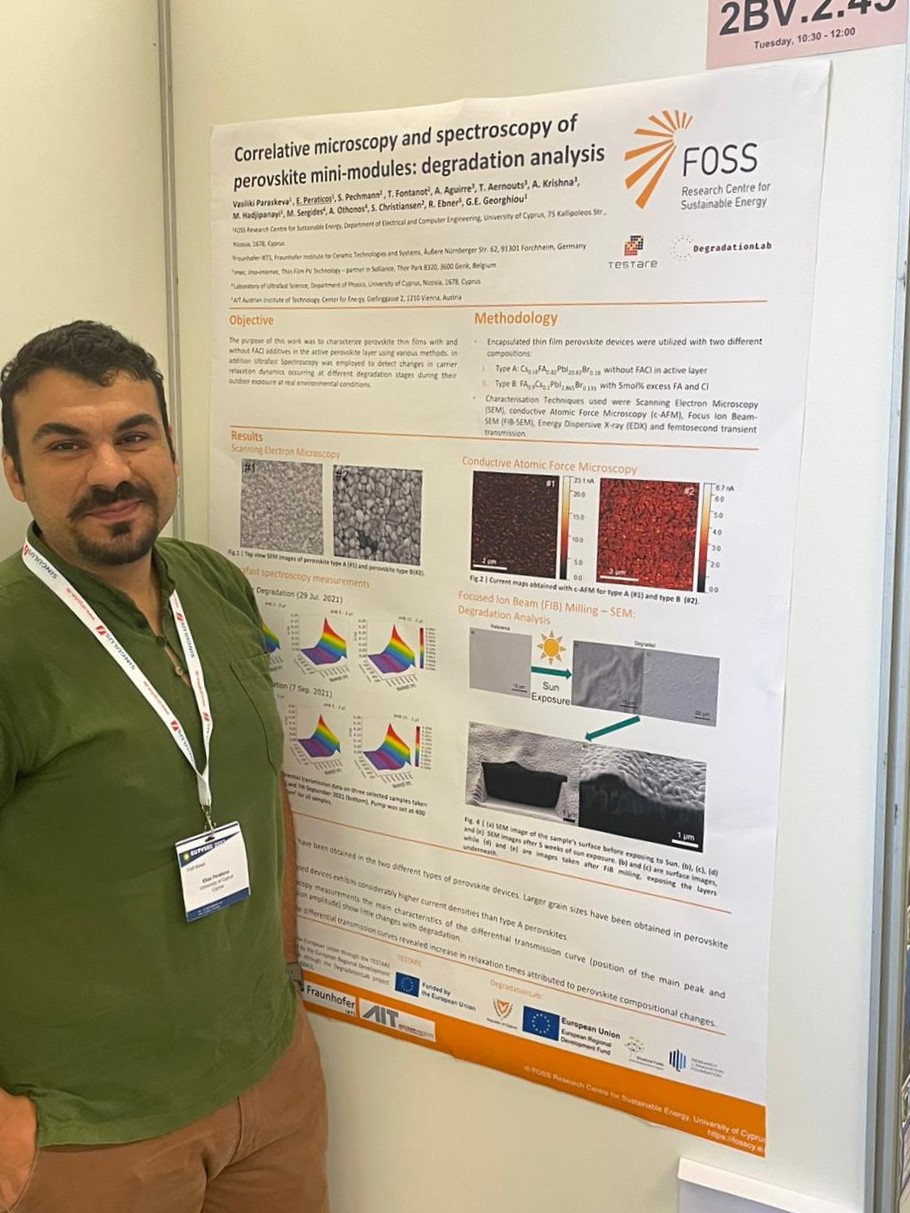
Newsletter #2
It is our pleasure to welcome you to the 2nd edition of the DegradationLab Newsletter!
“DegradationLab— Advanced centre for testing degradation and failures in new and emerging solar cells” is an ambitious project implemented by a network of 6 partner laboratories spanning across 4 European countries, namely Cyprus, Belgium, Austria, and Germany.
The DegradationLab strategic infrastructure unit coordinating a new Horizon Europe Twinning project
A new partnership that brings together four countries, Cyprus, Belgium, Germany and Israel has been launched for the implementation of a new project with the acronym «TESTARE» and entitled «Twinning for excellence in TEsting new generation PV: Long-term STAbility and field REliability». The Coordinator is the DegradationLab of the University of Cyprus. The “TESTARE” project has been selected for funding by the European Commission in the context of the "Twinning" Topic of the "Widening participation and spreading excellence" component of the "Horizon Europe" Program. The total project funding is €1,499,996.25 and the funding for the University of Cyprus is €557,500.00. The project team comprises the University of Cyprus (UCY) and internationally-leading research institutions, namely the Interuniversity Microelectronics Centre (IMEC) - Belgium, the Fraunhofer Institute for Solar Energy Systems - Germany and the Ben-Gurion University of the Negev (BGU) - Israel. In this project, the University of Cyprus will link effectively with the foreign organisations, aiming to stimulate excellence and innovation capacity at the DegradationLab of the PV Technology Laboratory in the field of long-term stability and field reliability testing of new and emerging photovoltaic (PV) technologies.
Key activities will include knowledge transfer, exchange of best practices between UCY and the leading partners, industrial networking and infrastructure sharing. The project will also focus on enhancing research management and administration capabilities at UCY to improve and make its research ecosystem more sustainable whilst the leading partners will gain access to new markets in the Middle East and North Africa (MENA) region. An exploratory research project will also take place within “TESTARE” assessing the performance and lifetime of perovskite on silicon tandem modules, which are considered extremely promising for low-cost and highly flexible photovoltaics suitable for integration into the urban environment.
“TESTARE” is expected to lead to long-term ties between the partners which will enhance the Research & Innovation ecosystem of Cyprus. The official launch date of “TESTARE” was the 1st of January 2023 and the project is scheduled to run for 36 months. The kick-off meeting was successfully held at the University of Cyprus on the 9th and 10th of February 2023.
The TESTARE project is funded by the European Union under Grant Agreement No. 101079488. For more information go to www.testare.eu
Seminars and workshops
The DegradationLab learning curves and results were presented in a few seminars and workshops from 2022 onwards. In particular:
- COST Action PEARL PV Conference ‘Enabling the PV Terawatt Transition’. Dr. Maria Hadjipanayi (Coordinator of DegradationLab project) participated as a Speaker in the WG1 session “PV Monitoring” on March 14th, 2022, from 14:35h to 15:05h CET, in Enschede, the Netherlands. The conference had hybrid format and its content (Program) was related to the main aim of this COST Action: to improve the energy performance and reliability of photovoltaic (PV) solar energy systems. This aim was embedded in research that was conducted in five Working Groups which organized five sessions at the PEARL PV Conference on resp. (1) PV Monitoring, (2) Reliability and Durability of PV, (3) PV Simulation, (4) PV in the Built Environment and (5) PV in Grids. UCY was a member of the COST Action PEARL. Dr. Hadjipanayi presented via online connection work performed in the DegradationLab project (title of presentation: ‘Field monitoring of perovskite modules: experiences and learning curves’). [Abstract]
- University of Cyprus School of Engineering Seminar Series: Dr. Maria Hadjipanayi presented (remotely) on "Degradation Lab - Experiences and learning curves in outdoor monitoring of perovskite PV", on the 11th of May 2022, as part of the School of Engineering Seminar Series of the University of Cyprus. To this seminar series, all the members of the academic and research staff of the School of Engineering are invited to attend. This was a good opportunity to raise visibility to the UCY scientific community for the newly established research laboratory DegradationLab.
- Seminar series from FOSS Research Centre for Sustainable Energy: Dr. Matthew Norton, senior team member of the DegradationLab, presented to FOSS academic and research staff/students/interns the talk titled ‘DegradationLab: Advanced characterization infrastructure for emerging photovoltaic technologies’. The seminar took place at UCY new campus.
- International PV Quality Assurance Task Force (PVQAT) Seminar Series: Dr. Vasiliki Paraskeva, senior research team member of the DegradationLab presented on the 7th March 2023 results from the DegradationLab project and in particular an ‘Outdoor study of perovskite mini-modules: Seasonal impacts’. This seminar series is organized by the US National Renewable Energy Laboratory (NREL) as part of the PVQAT initiative (https://www.pvqat.org/), and in particular Task Group 8: Thin-Film Photovoltaics/Perovskite Sub-group, with the aim for getting the relevant scientific community together to discuss trends in degradation observed in field testing and indoor accelerated tests.
- Workshop on Advanced Materials for Optoelectronics and Other Applications: Dr. Vasiliki Paraskeva presented on the 4th July 2023 results from the DegradationLab project at the final workshop for the NANOSONICS project (project co-financed by the European Regional Development Fund (ERDF) and the Republic of Cyprus through the Research and Innovation Foundation, Grant ID: Infrastructures/1216/0004). Title of her presentation was ‘Indoor and outdoor characterization of perovskite mini- modules’. The event took place at the Physics Department of UCY and was attended by academics and researchers from UCY and the Cyprus University of Technology. tests.
EUSEW event and Open Lab day (27th June 2023)
The University of Cyprus (UCY) organized the final workshop of the DegradationLab project within the framework of the European Sustainable Energy Week (EUSEW) on the 27th June 2023 at the UCY campus premises in Nicosia, Cyprus. The event was jointly organized by the DegradationLab project and the TESTARE project (www.testare.eu), which is essentially the continuation of the DegradationLab efforts. The event titled ‘1st Cypriot PV Workshop: DegradationLab and TESTARE Joint Event’ was registered as a Sustainable Energy Day in Cyprus in order to increase its visibility and attract interested stakeholders.
The target of this workshop was to present as an overview the latest trends in Research and Development in PV in Cyprus and beyond. It provided the scientific background in the field of new-generation PV and emerging technologies, with an emphasis on their stability and reliability. Partners of DegradationLab and of TESTARE projects individually presented their latest work directly aligned to the topic of interest of the event. In addition, external speakers were invited from Cypriot academic community to present their latest research in new generation PV. The workshop was intended for the local and international scientific community, industry, enterprises, young researchers and stakeholders in the PV energy sector.
The participants were introduced to the activities of the DegradationLab project, the new infrastructure capabilities, project results, as well as being introduced to the recently started TESTARE project to take place after the end of the Degradationlab project such as a local industry event, PhD summer schools, scientific trainings, etc. In addition, the attendees had the opportunity as part of an Open Lab Day to visit the new DegradationLab facilities developed during the DegradationLab project. There was a guided tour in the two laboratory sites, namely in the PV Technology Laboratory, new UCY campus site and in the Latsia UCY annex site.
The event was hybrid in format so that external participants and speakers from abroad could participate. In summary, the event attracted in total 69 participants internationally (from which 32 connected online). Networking and discussions took place after the event and during the presentation of the experimental facilities.
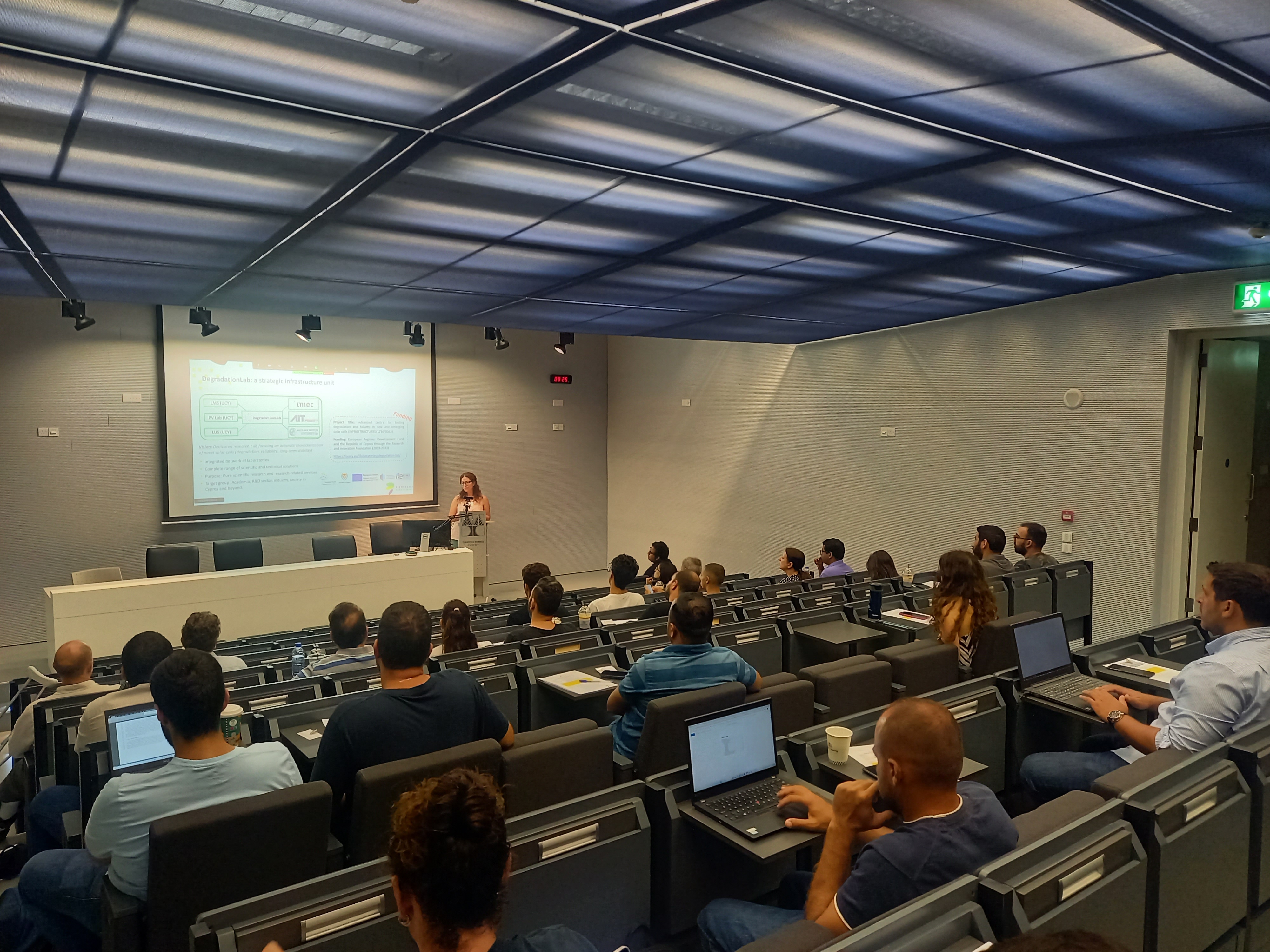 |
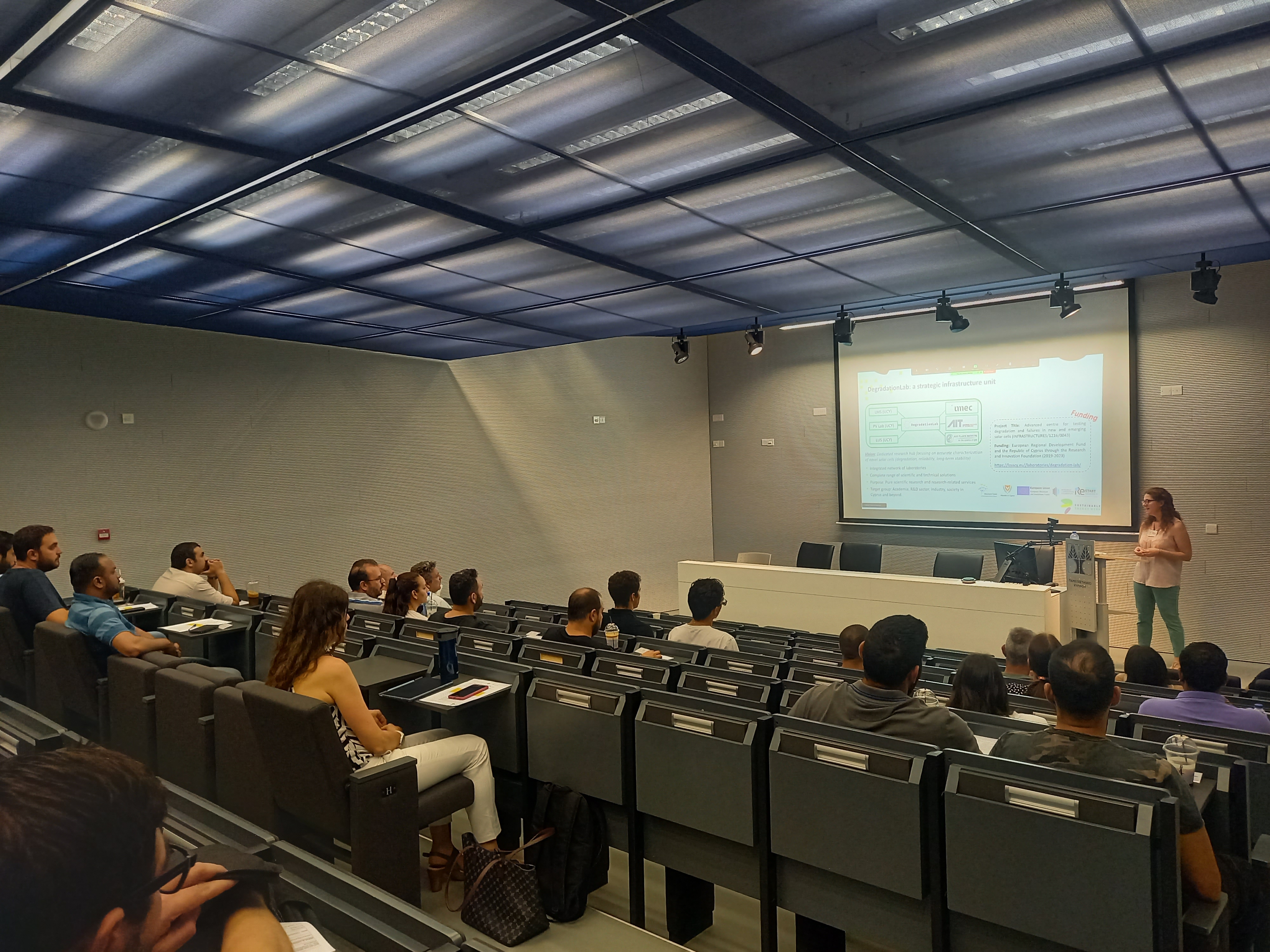 |
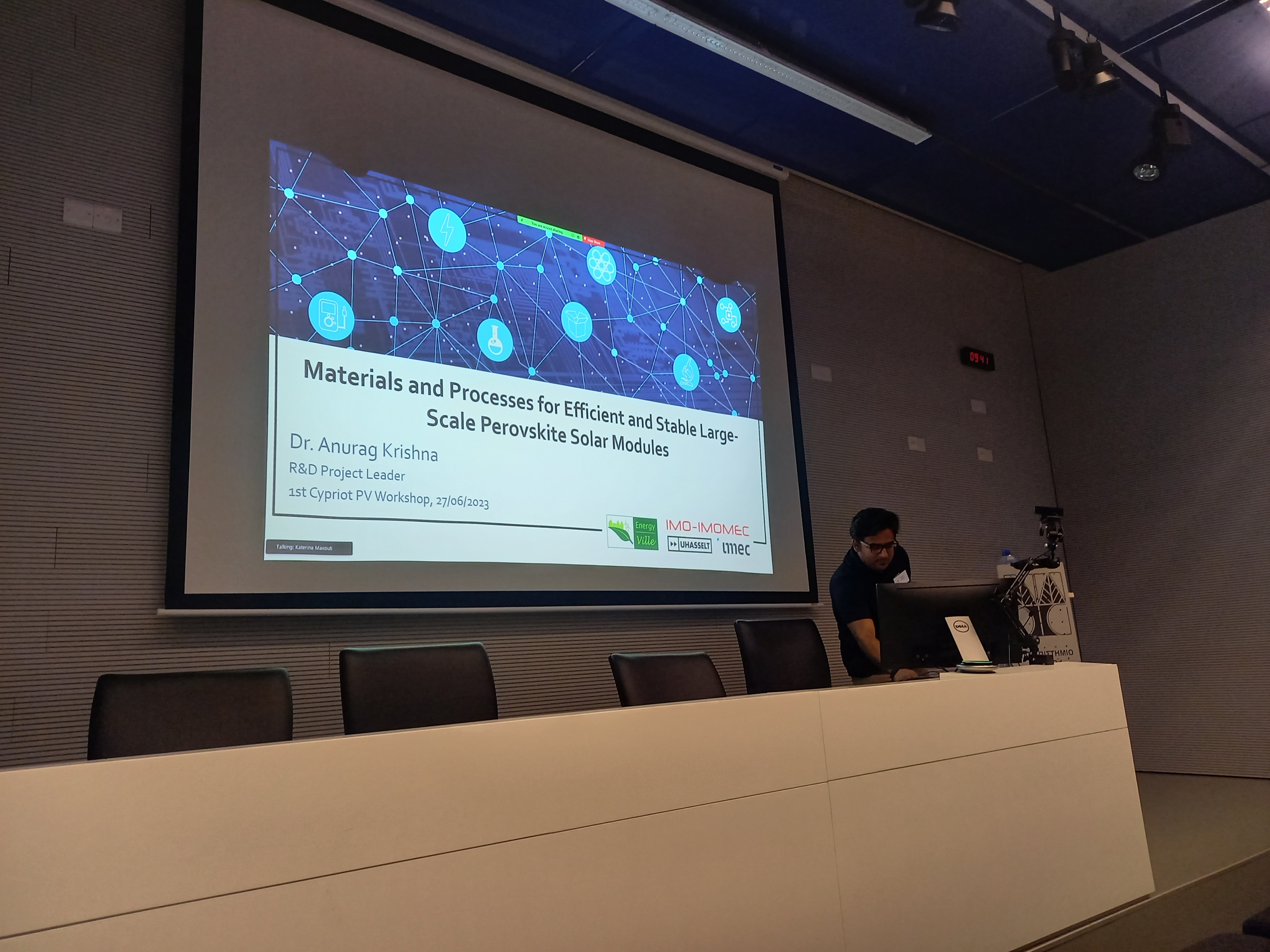 |
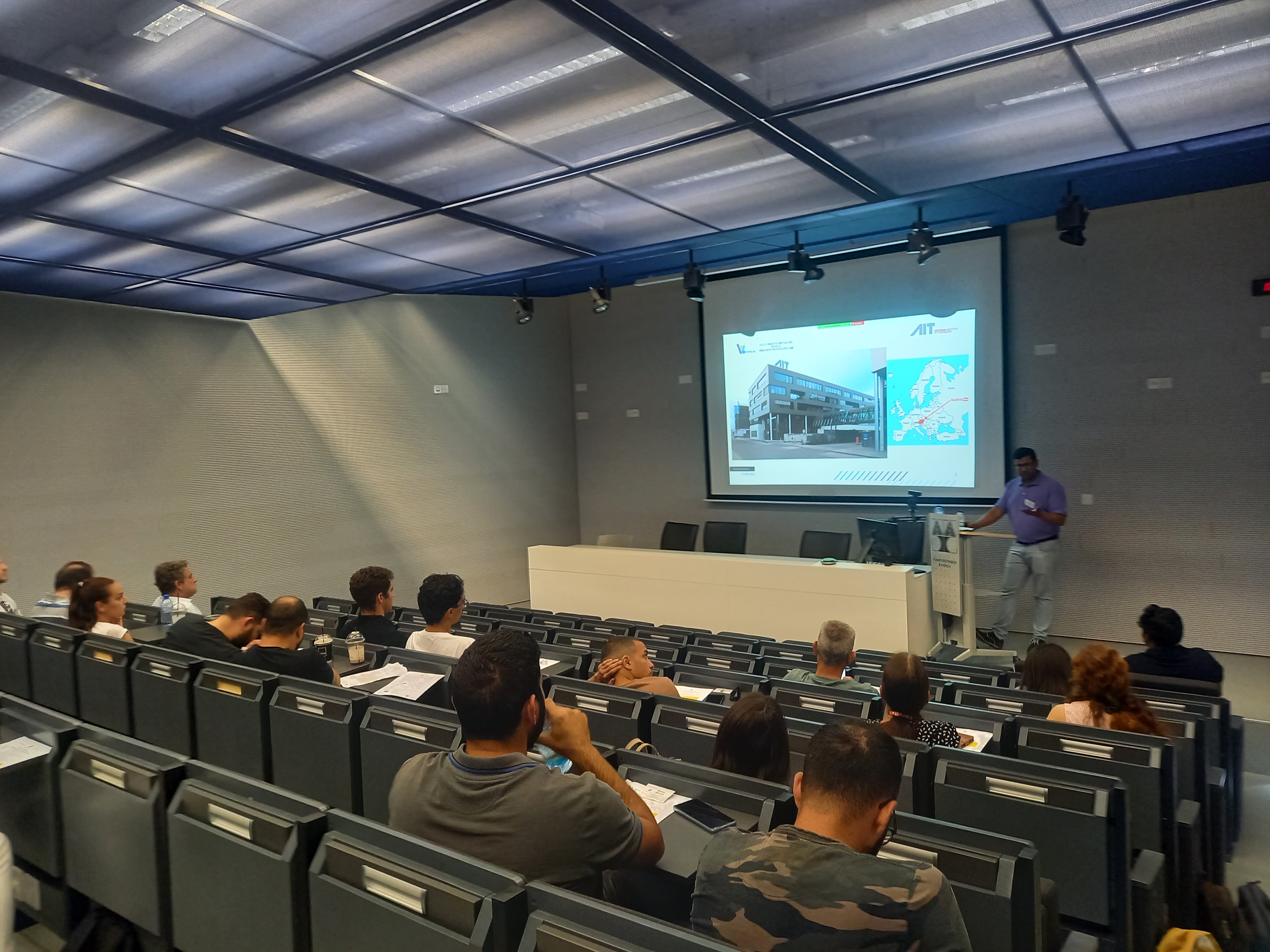 |
 |
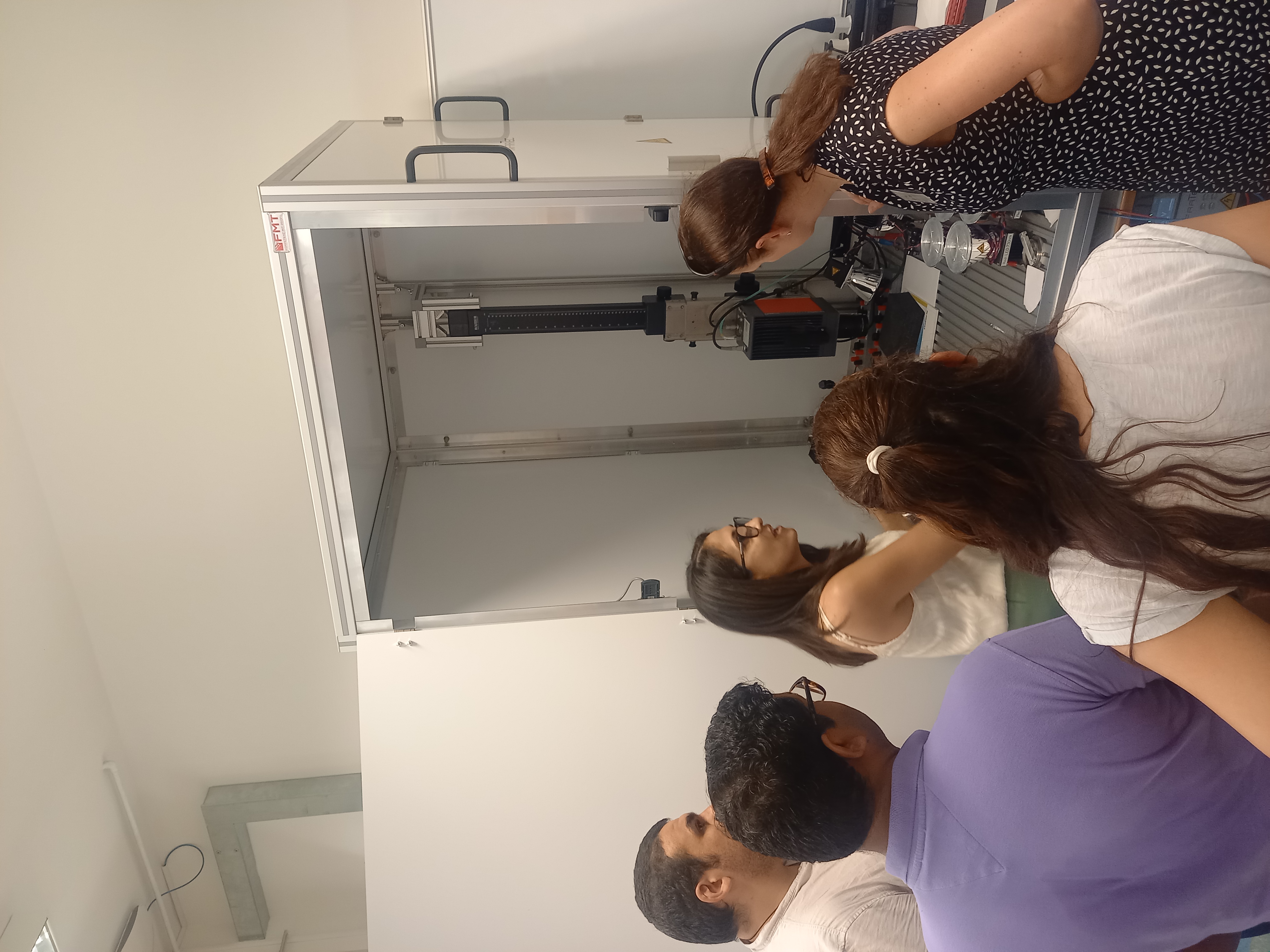 |
Educational seminars in secondary schools
On the 27th and the 28th of April 2023, Dr. Maria Hadjipanayi, coordinator of the DegradationLab project, participated in the “Researchers at School” Programme in the context of the research project CONNECT (“Cyprus ON a mission to Engage, inspire and Connect with citizens through the European Researchers' Night”) of the Cyprus Research and Innovation Foundation (RIF). This initiative entailed the implementation of a number of visits by Scientists at schools all over Cyprus in accordance with the following 2023 World Days: World Earth Day, World Cancer Day, World Cities Day, World Oceans Day, and World Food Day. Dr. Hadjipanayi, as part of the World Earth Day 2023, presented the research activities of the DegradationLab team of the PV Technology Lab of the University of Cyprus to the students of two secondary schools: the Ayios Dometios and the Geri Gymnasiums. The students were introduced in simple terms to the world of research with the aim of gaining an insight into the scientists’ mission. The seminars, entitled ‘Clean Energy – Researchers in Schools – Earth Day 2023’, included a presentation of the research areas of the newly established strategic unit DegradationLab, its infrastructure and the study of new emerging technologies as well as a practical on-site demonstration of different PV technologies. The organization of these school visits was done by the Cyprus Research and Innovation Foundation in coordination with each respective school administration.
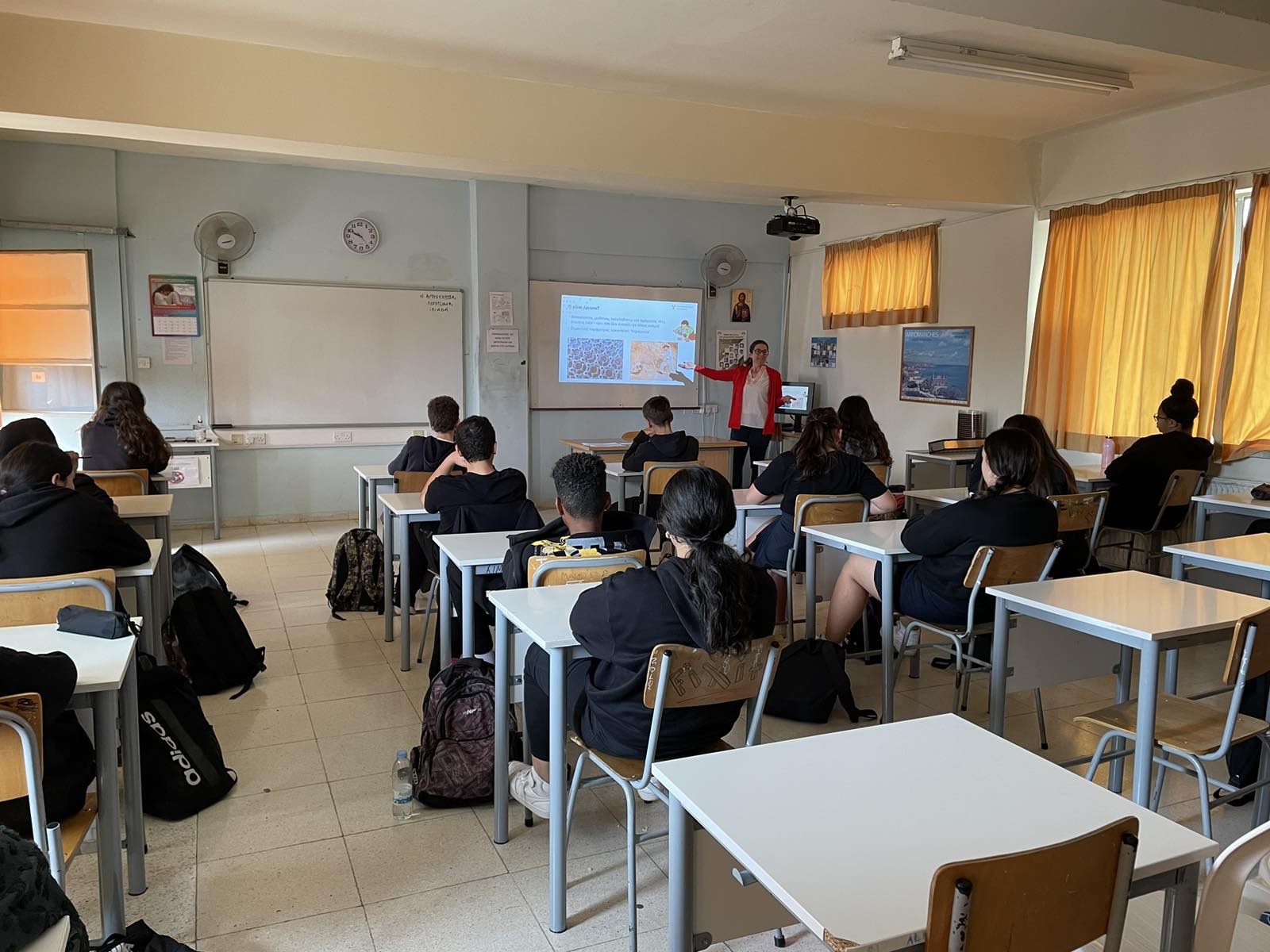

Newsletter
31/12/2020The 1st Newsletter of the DegradationLab is now available! Please go to this link to find out the latest updates from the project with a particular focus on the new infrastructure developed at the University of Cyprus.

Commisioning of new equipement and training
01/10/2020For the development of the new infrastructure of the DegradationLab, the researchers involved underwent a series of procedures for tendering, offer evaluation, contract signing with providers, purchasing, accepting and commissioning of the new equipment. In addition, during commissioning, our research team was trained by engineers of the Contracting companies in using the new equipment and obtaining high quality measurements. For more information please go to this link.

ResearchGate Page
01/10/2020Our new Research Gate page is also launched. Tune in for more updates: RG-DegradationLab.

Kickoff Meeting
01/07/2019The kick-off meeting of the project DegradationLab was hosted with great success on the 1st of July 2019 at the University of Cyprus (Lead partner). The project is funded by the Research Promotion Foundation (Cyprus) under the programme 'New Strategic Infrastructure Units - Young Scientists'. Its main aim is to create a research unit for testing degradation and failures in new and emerging solar cells through the use of advanced optoelectronic, spectroscopic, and structural techniques. The focus will be on the accurate characterization of perovskite solar cells which exhibit high conversion efficiencies and offer the potential to realize a low-cost, industry-scalable PV technology. The development of the new infrastructure has strategic importance for the University of Cyprus towards developing this timely and challenging field. To this end, the DegradationLab brings together three laboratories from the University of Cyprus (the Photovoltaic Technology Laboratory, the Laboratory of Molecular Spectroscopy, and the Laboratory of Ultrafast Science) with three excellent European research organizations, namely IMEC (Belgium), the AIT Austrian Institute of Technology (Austria), and the Max Planck Institute for the Science of Light (Germany).